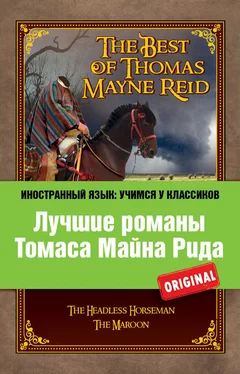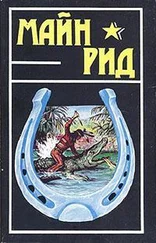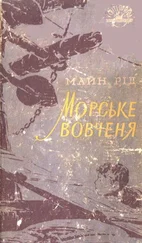For a while after the departure of Cynthia, the temple of Obi remained untenanted, except by its dumb deities: its priest having gone to ferry his neophyte [545] across the lagoon.
In a few minutes he returned alone – having left the mulatta to make her way up the cliff, and homeward to Mount Welcome, where she belonged.
It was evident that the visit of the mulatta had given him gratification. Even in the dim light of his lard lamp an expression of demoniac joy could be distinguished upon his ferocious visage, as he re-entered the hut.
“One dead!” cried he, in an exulting tone; “anodder upon ’im death-bed; and now de third, de las’ an’ wuss ob ’em all – ha! ha! ha! – he soon feel de vengeance ob Chakra, de myal-man!”
Thrice did the wild, maniac-like laugh peal from under the spreading limbs of the ceiba – reverberating with an unearthly echo against the cliffs that hemmed in the Duppy’s Hole. It startled the denizens of the dark lagoon; and, like echoes, came ringing up the ravine the scream of the crane, and the piercing cry of the wood-ibis.
These sounds had scarce died away, when one of a somewhat different intonation was heard from above. It resembled a shriek; or rather as if some one had whistled through his fingers. Whoever gave utterance to the sound was upon the top of the cliff – just over the hut.
Chakra was not startled. He knew it was a signal; and that it was given by the guest he was expecting.
“Das de ole Jew!” muttered he, taking the rum-bottle, and concealing it under the bedstead. “You stay dar till I wants ye ’gain,” added he, addressing himself in a confidential tone to this, the object of his greatest adoration. “Now for de nigga-dealer! I’se hab news fo’ him ’ll tickle ’im in de ribs like a ole guana lizzard. Not dat Chakra care fo’ him. No – only, on dis voyage, boaf am sailin’ in de same boat. Da he go ’gain!”
This last exclamation referred to a repetition of the signal heard further down: as if he who was sounding it was advancing along the cliff, towards the gorge at the lower end.
A third call proceeded from that point where the tree stairway scaled the precipice – indicating to Chakra that his visitor was there awaiting him.
Without further delay, the ferryman – grim as Charon himself – returned to his canoe; and once more paddled it across the lagoon.
While Chakra was thus occupied, a man could be seen descending the cliff, through the tangle of climbing plants, who, on the arrival of the canoe at the bottom, was standing, half concealed among the bushes, ready to step into it. The moon shone upon a blue body-coat, with bright buttons; upon a brown beaver hat and white skull-cap; upon tarnished top-boots, green goggles, and an enormous umbrella.
Chakra did not need to scan the sharp Israelitish features of the man to ascertain who he was.
Jacob Jessuron was there by appointment; and the myal-man knew both his presence and his purpose.
Not a word of recognition passed between the two, nor sign. Only a caution from Chakra – as the Jew, swinging by a branch, let himself down into the canoe.
“’Tep in lightly, Massr Jake, an’ doan’ push da canoe down ’tream. ’T am jess’ as much as I kin do to keep de ole craff out ob de eddy. Ef she get down da, den it ’ud be all up wifh boaf o’ us.”
“Blesh my soul! D’you shay so?” rejoined the Jew, glancing towards the gorge, and shivering as he listened to the hoarse groaning of the water among the grim rocks. “S’help me, I didn’t know it was dangerous. Don’t fear, Shakra! I shtep in ash light ash a feather.”
So saying, the Jew dropped his umbrella into the bottom of the boat; and then let himself down upon the top of it, with as much gentleness as if he was descending upon a basket of eggs.
The ferryman, seeing his freight safely aboard, paddled back to the mooring-place; and, having secured his craft as before, conducted his visitor up the valley in the direction of the hut.
On entering the temple of Obi, Jessuron – unlike the devotee who had just left it – showed no signs either of surprise or fear at its fantastic adornments. It was evident he had worshipped there before.
Nor did he evince a special veneration for the shrine; but, seating himself familiarly on the bamboo bedstead, uttered as he did so a sonorous “Ach!” which appeared as if intended to express satisfaction.
At the same time he drew from the ample pocket of his coat a shining object, which, when held before the lamp, appeared to be a bottle. The label seen upon its side, with the symbolical bunch of grapes, proved it to be a bottle of cognac.
The exclamation of the myal-man, which the sight of the label had instantaneously elicited, proved that on his side equal satisfaction existed at this mode of initiating an interview.
“Hash you a glass among your belongingsh?” inquired the Jew, looking around the hovel.
“No; dis yeer do?” asked his host, presenting a small calabash with a handle.
“Fush rate. Thish liquor drinksh goot out of anything. I had it from Capten Showler on hish lasht voyage. Jesh taste it, good Shakra, before we begins bishness.”
A grunt from the negro announced his willing assent to the proposal.
“Whugh!” he ejaculated, after swallowing the allowance poured out for him into the calabash.
“Ach! goot it ish!” said his guest, on quaffing off a like quantity; and then the bottle and gourd being set on one side, the two queer characters entered into the field of free conversation.
In this the Jew took the initiative.
“I hash news for you,” said he, “very shtrange news, if you hashn’t already heard it, Shakra? Who dosh you think ish dead?”
“Ha!” exclaimed the myal-man, his eye suddenly lighting up with a gleam of ferocious joy; “he gone dead, am he?”
“Who? I hashen’t told you,” rejoined the Jew, his features assuming an expression of mock surprise. “But true,” he continued, after a pause; “true, you knew he wash sick – you knew Justish Bailey wash sick, an’ not likely to get over it . Well – he hashen’t, poor man! – he’s dead and in hish coffin by thish time: he breathed hish lasht yesterdays.”
A loud and highly-aspirated “Whugh!” was the only answer made by the myal-man. The utterance was not meant to convey any melancholy impression. On the contrary, by its peculiar intonation, it indicated as much satisfaction as any amount of words could have expressed.
“It ish very shtrange,” continued the penn-keeper, in the same tone of affected simplicity; “so short a time shince Mishter Ridgely died. Two of the three shustices that sat on your trial, goot Shakra. It looksh ash if Providensh had a hand in it – it dosh!”
“Or de Dibbil, mo’ like, maybe?” rejoined Chakra, with a significant leer.
“Yesh – Gott or the Devil – one or t’other. Well, Shakra, you hash had your refenge, whichever hash helped you to it. Two of your enemies ish not likely to trouble you again; and ash for the third – ”
“Nor he berry long, I’se speck’,” interrupted the negro, with a significant grin.
“What you shay?” exclaimed the Jew, in an earnest undertone. “Hash you heard anythings? Hash the wench been to see you?”
“All right ’bout her, Massr Jake.”
“Goot – she hash been?”
“Jess leab dis place ’bout quar’r ob an hour ’go.”
“And she saysh she will help you to set the obeah-shpell for him?”
“Hab no fear – she do all dat. Obi had spell oba her, dat make her do mose anythin – ah! any thin’ in de worl’ – satin shoo. Obi all-powerful wi’ dat gal.”
“Yesh, yesh!” assented the Jew; “I knowsh all that. And if Obi wash to fail,” added he, doubtingly, “you hash a drink, goot Shakra – I know you hash a drink, ash potent as Obi or any other of your gotsh.”
Читать дальше
Конец ознакомительного отрывка
Купить книгу











